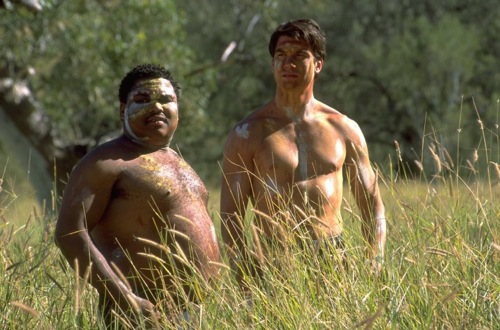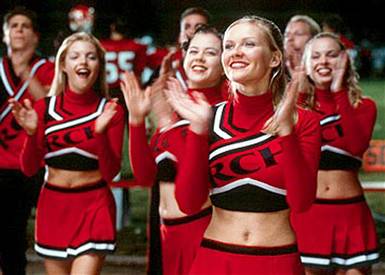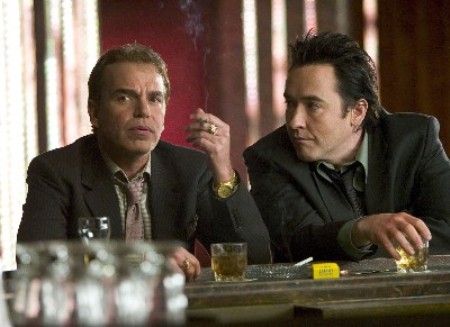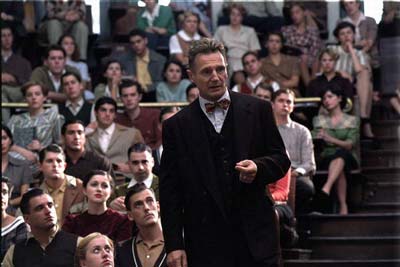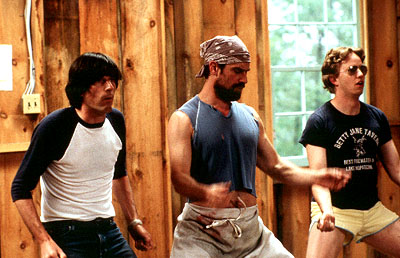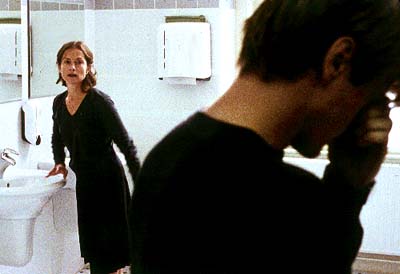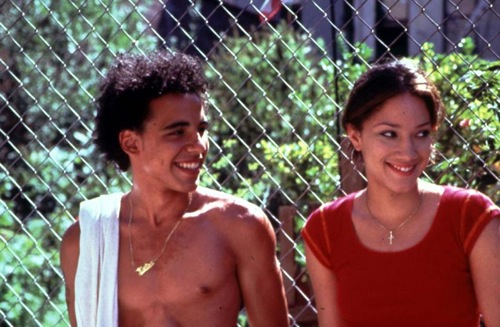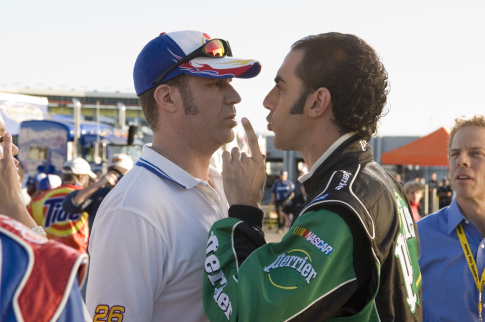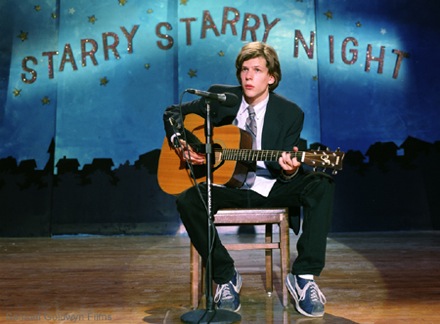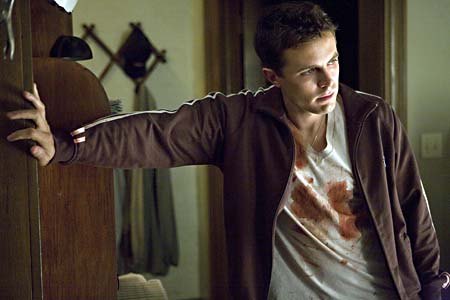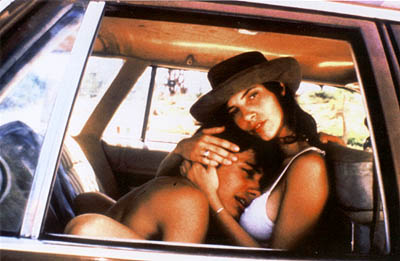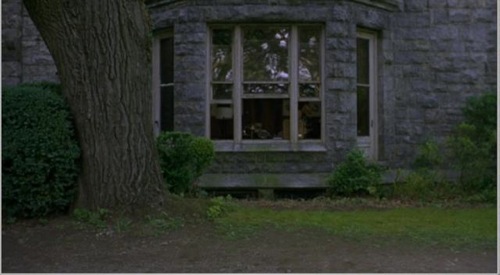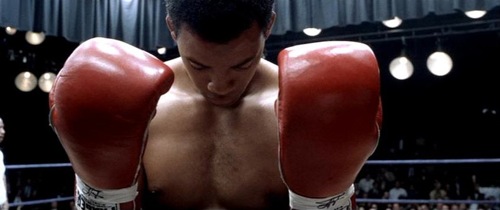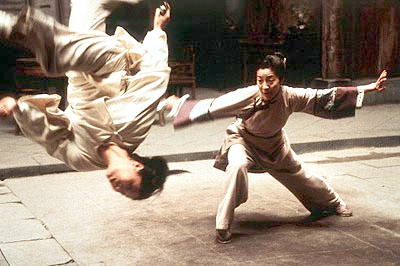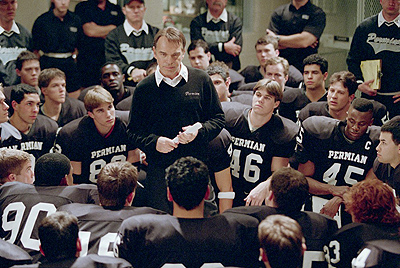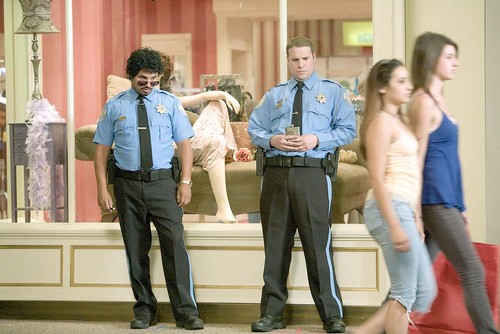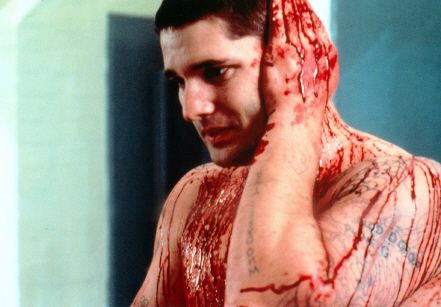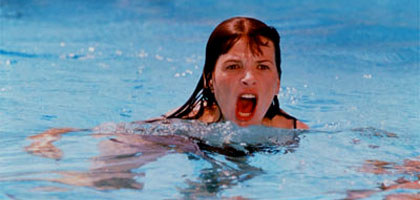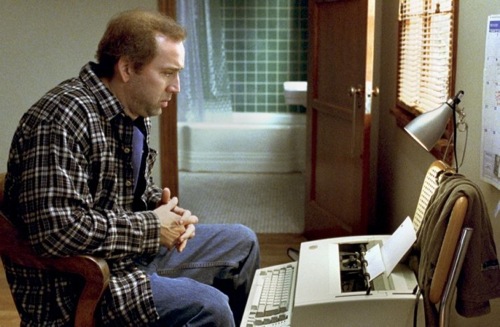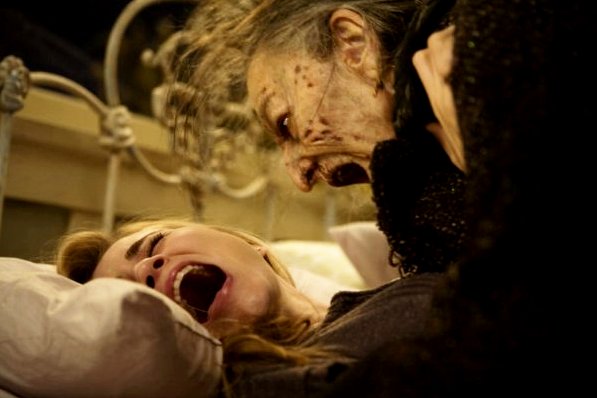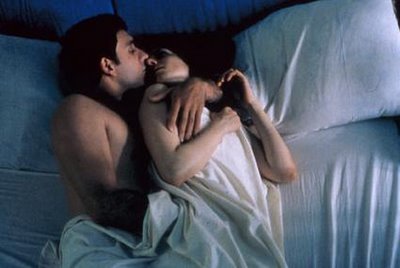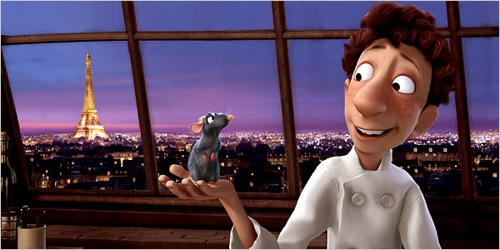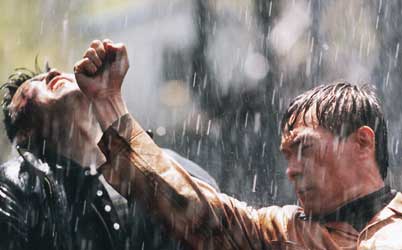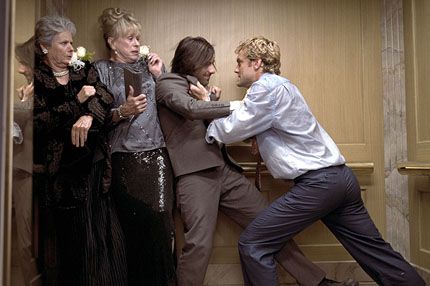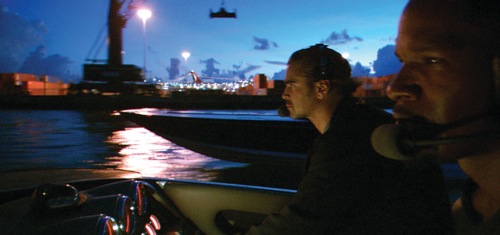"Remember the bad guys on the shows you used to watch on Saturday mornings? Well, these guys aren't like those guys. They won't exercise restraint because you are children. They will kill you if they get the chance. Do not give them that chance."
Preamble
Combine the contentious tenor of the times with the monumental changeover from film to digital, and you would think this past decade would've been a watershed for the medium. It wasn't. If anything, it was a regression. Though there were a number of fine, paradigm-shattering films released over the last ten years, our most talented filmmakers embraced limiting technology (i.e. 3-D and performance capture) in order to appear "forward-looking". In the process, they forgot, or simply stopped caring about, the limitless possibilities of storytelling - right as they were about to enter the most exciting artistic period of their careers. Basically, they gazed into the abyss, realized it was their bathroom mirror, and ran back to the sandbox.
Though Spielberg shrunk from the challenge, many younger filmmakers took up the gauntlet and became our generation's Scorseses, Coppolas and Malicks. Some came from music videos, a few stumbled out of the Sundance lab, and one got his start shooting a geeky British television series. Film may be stagnating, but it isn't hurting; it's just waiting for these new talents to push the medium forward. And from what I've heard about their upcoming efforts, we've every reason to be hopeful.
Now about this list...
My movie decade began inauspiciously with the unsigned Walter Hill film, SUPERNOVA. It will likely end - auspiciously, I hope - with James Cameron's AVATAR. That's right: like everyone else, I have not seen AVATAR, and probably won't until next week. I am also waiting on THE LOVELY BONES, INVICTUS, NINE, SHERLOCK HOLMES and ALVIN AND THE CHIPMUNKS 2: THE SQUEAKQUEL. Obviously, the Cameron and Jackson films stand a decent chance of cracking the top 100 if either director is at the top of his game. But since I don't feel like waiting until the Christmas holiday to reflect on a full ten years of movies, I've decided to just do my list now, and make adjustments if need be. And if you've got a problem with that, remember that Premiere and American Film closed out the '80s in October of '89 by calling it for Martin Scorsese's RAGING BULL. I'd like to think my number one is equally clear cut.
As for criteria, these are not "The 100 Most Important Films of the Decade", nor are they "The 100 Most Award-Worthy Films as Determined by a Group of Fifteen or So Oscar Bloggers Trying To Decipher The Whims of Academy Voters." This is my list. These are the films that moved me, that connected emphatically on their own terms. In other words, just because you tried to put the kibosh on the trading of conflict diamonds doesn't mean your film is automatically worthier than a pseudo-documentary that climaxes with some idiot shoving a toy car up their ass. Pedigree and genre are irrelevant to me; conviction, on the other hand, is key.
In terms of ranking, this list is, aside from the top fourteen, not set in stone. In writing up the first twenty-five movies, I dropped out two titles and bumped one up into the top fifty. One of the films was omitted because I felt I was kowtowing to its cultural significance; when pressed, I decided I really liked the film, but not enough to put it above forty-seven other excellent movies. That film (and many others) will be found on the "Just Missed" list, which I'll publish with the top twenty-five.
Finally, because I have not had time to re-watch every film on this list, I have opted to excerpt paragraphs from previous reviews (if one was written). Since I doubt anyone remembers what I wrote the first time around, I have no qualms with quoting myself (even though it's what conceited individuals typically do). Also, the passage of time has allowed certain films to overtake others in stature. So don't go looking to my previous top tens (if you can find them) for hints as to what the top movies might be. Enough. The first twenty-five...
100. BRING IT ON (2000, d. Peyton Reed, w. Jessica Bendinger)
I'm not joking. Dubbed "The CITIZEN KANE of cheerleader movies" by no less an authority than Roger Ebert (even though he shorted the film a couple of stars in his initial review), Peyton Reed's BRING IT ON is that rare teen-skewing film that manages to please its audience (basically by not being boring), while smuggling in clever, subversive elements for older men desperate to justify their ninety-minute leer. From the exuberant opening musical number (quite unexpected at the time) to the climactic cheer competition (where you're rooting for Kirsten Dunst's team to finish second), Reed and screenwriter Jessica Bendinger combine to deliver an uncommonly smart high school comedy worthy of John Hughes in his prime. There are lots of terrific individual scenes (like the flirty brush-off between Kristen Dunst and Jesse Bradford, or, y'know, the bikini car wash), but the film's secret weapon is mighty Ian Roberts goin' Fosse as Sparky Polastri, a pill-popping mercenary choreographer who maniacally preaches the gospel of "spirit fingers". Reed quietly went on to have a terrific decade with DOWN WITH LOVE and THE BREAK-UP. The Jim Carrey vehicle YES MAN was his only (minor) misstep. And then there's the whole FANTASTIC FOUR fiasco, which, if nothing else, will make for a juicy chapter in his memoir.
99. THE ICE HARVEST (2005, d. Harold Ramis, w. Robert Benton and Richard Russo)
Harold Ramis's cold-hearted, Christmas-set Midwestern noir about a Wichita, Kansas mob lawyer's inept attempts to cut out of town with the ill-gotten haul of a lifetime is as deliciously nasty a take on human venality as FARGO. But there's no Marge Gunderson to offset the unpleasantness, so audiences stayed the hell away when an indifferent Focus Features left the film for dead over the 2005 Thanksgiving holiday. Critics weren't much help back then either (dirty little not-so-secret: if it's November, and the studio ain't pushing for an Oscar, publicists will practically write a dismissive review for you), but perceptive fellas like The A.V. Club's Nathan Rabin have begun to throw down in defense of this unrepentantly bleak number, which avoids being a complete soul-crusher thanks to Ramis's understatement and John Cusack's sympathetic portrayal of the poor sap protagonist who's got it coming. The ever-undervalued Oliver Platt is also likable as an incorrigible drunk who's unhappily married to Cusack's harpy of an ex-wife. Save this one for Christmas Eve with the family!
From my 2006 Collider review: "Only a filmmaker with the ingratiating instincts of Harold Ramis could make a noir as pleasurably nasty as The Ice Harvest, in which fingers are severed, feet are stabbed and heads blown clean off to offhandedly comedic effect. Ramis isn’t mean enough to delight in the grisliness of Scott Phillips novel, adapted by the expert screenwriting team of Robert Benton and Richard Russo, so he just shoots it all in his typically understated manner, preferring matter-of-factness to wallowing in the gore. The result is a lean, eighty-nine minute existential muse that lends itself to repeat viewings."
98. KINSEY (2004, w. & d. Bill Condon)
From my 2004 AICN review: "Moderation... [is] the most telling characteristic of Bill Condon’s striking, controlled, and deeply affecting KINSEY. Navigating the many pitfalls that normally render the biopic a thudding, studious bore, Condon has pieced together a sympathetic portrait of the complex and still controversial sexologist Alfred Kinsey, who destroyed a nation’s ignorant notions about sexuality with the publication of his SEXUAL BEHAVIOR IN THE HUMAN MALE, and, in the process, sowed the seeds of his own (unjustifiably) ignoble downfall at the hands of outraged academics and religious fanatics. Because Kinsey’s findings remain largely antithetical to the beliefs of certain strict (and well-funded) Christian Right organizations and their inveighing, microphoned mouthpieces, one expects that the film will be subject to the same cannily organized charges that have sought to invalidate his findings ever since the first study was made public in 1948. But Condon’s careful, compassionate work will stand as its own loud refutation of such fact-challenged noise, for his is a film interested in opening minds rather than closing them." It should also be noted that, between KINSEY and DREAMGIRLS, Condon has quietly established himself as one of our more gifted widescreen composers - and while I love a good deal of the latter film, KINSEY is, for whatever reason, the one that keeps resonating.
97. WET HOT AMERICAN SUMMER (2001, d. David Wain, w. Wain and Michael Showalter)
Because any film in which Christopher Meloni gets a knowing nod from a can of mixed vegetables (after said can helped him work through his shame-ridden sexual yearnings for inanimate objects) is one for the ages. But also because then rookie director David Wain pulled off a minor miracle in parodying '80s summer camp movies while actually making his own '80s summer camp movie. Strip away the absurd humor, and, at its core, WET HOT AMERICAN SUMMER is a bittersweet tale of first love, with Michael Showalter's nice guy Coop trying to steal nice girl Katie (Marguerite Moreau) away from bad boy Andy (Paul Rudd) - who, while trying to get in Elizabeth Banks's pants, twice commits negligent homicide. Katie's farewell speech to Coop is the most horrifying worst-fears-realized moment in a high school film since Lawrence Monoson walked in on Diane Franklin and Steve Antin kissing in THE LAST AMERICAN VIRGIN. But the film's piece de resistance is Michael Ian Black sneaking off to the equipment shed for a torrid tryst with a most unexpected paramour.
96. THE PIANO TEACHER (2002, w. & d. Michael Haneke)
Isabelle Huppert is a severe piano teacher whose repressed sexual desires explode when she enters into a lustful relationship with one of her students (Benoit Magimel). The young man wants the usual (straight-up fucking), but the teacher, who's spent many lonely years honing her fetishistic yearnings (all the while returning home to sleep in the same bed as her equally severe mother), wants to play sadomasochistic games. The unraveling that follows is painful to watch, but, if you can stomach it, it's one of the most intellectually credible studies of sexually aberrant behavior ever put to film. Take that, Zalman King.
95. RAISING VICTOR VARGAS (2002, d. Peter Sollett, w. Sollet and Eva Vives)
A big-hearted romantic comedy set in Manhattan's Lower East Side, RAISING VICTOR VARGAS was exactly the kind of hopeful, homegrown film we needed to see out of the city after 9/11. Though it was shot prior to the attacks, Peter Sollett's movie still felt like a defiant, shoulder-brushing answer to the nation's doubts about the resilience of NYC; I mean, what could be more comforting in the wake of an unthinkable tragedy than the sight of teenage kids falling in and out of love like nothing ever happened? This may be a lot to heap on a small-scale independent film, but that's honestly the way I felt after watching a screener of RAISING VICTOR VARGAS in late 2002. That was the moment I knew we'd be okay. Sollett and Eva Vives wrote their screenplay for this largely non-professional cast after shooting the short film "Five Feet High and Rising" with them. Remarkably, no one runs away with the movie: Victor Rasuk and Judy Marte are terrific as the young could-be lovers, Silvestre Rasuk is immensely sympathetic as Victor's piano-prodigy little brother Nino, and Altagracia Guzman earns huge laughs as the overburdened grandmother trying her damndest to raise two very different boys. Whereas most filmmakers troll ethnic big-city neighborhoods looking for misery or inspiration, Sollett went looking for a universal story. It's a beautifully done, stunningly assured work (with nice, understated cinematography from Tim Orr), and it deserves a wider audience.
94. TALLADEGA NIGHTS: THE BALLAD OF RICKY BOBBY (2005, d. Adam McKay, w. McKay and Will Ferrell)
From my 2005 Collider review: "Ricky Bobby, the Michael Jordan of NASCAR played to jut-jawed perfection by Will Ferrell in Talladega Nights, loves to go fast and finish first. And when he doesn’t finish first, he doesn’t finish at all, preferring to smash up his high-performance stock car while hewing to the philosophy of his no-account drunk of a father: “If you ain’t first, you’re last”. Luckily for Ricky Bobby, he’s one hell of a driver; as he brags to an on-track reporter, “When I wake up in the morning, I piss excellence.” And his winning ways have netted him millions of dollars in endorsements, a smokin’ hot wife (Leslie Bibb), two bratty children who enjoy threatening their decrepit grandfather with physical violence, and the unflagging loyalty of his best friend and racing team partner, Cal Naughton (John C. Reilly)." Though not as memorably insane as ANCHORMAN: THE LEGEND OF RON BURGANDY, this is still vintage McKay/Ferrell. And the addition of Sacha Baron Cohen as an aggressively French (and gay) nemesis for the aggressively American Ricky Bobby gives the film a subversive charge that, shockingly, didn't seem to bother the NASCAR faithful, who helped make TALLADEGA NIGHTS a box office smash. I initially though McKay could've been rougher in parodying this culture, but "You taste of America" sends the right message.
93. THE SQUID AND THE WHALE (2005, w. & d. Noah Baumbach)
From my Collider review interview with Noah Baumbach: "MIA since 1997, Noah Baumbach has finally returned to filmmaking with the cruelest dramatization of divorce since Alan Parker’s Shoot the Moon, though this one’s preferable because it has the good sense to be funny. That’s not meant to be snide in the least; as anyone lucky enough to have a front seat to marital discord in their youth will tell you, there’s something queasily amusing about the disintegration of one’s family. Oh, sure, you cry a lot, start listening to The Smiths and, maybe, begin experimenting with drugs, but watching the two people who instilled your moral foundation act like fools is the stuff high comedy. You have to laugh; the only other option is depression, and you might as well wait until you hit your own adulthood before opting into the great gray." If you've ever experienced anything close to what's depicted in Baumbach's film, you know why it's here. Even if he sort of blows it after pulling the trigger on the Big Third Act Incident, THE SQUID AND THE WHALE gets across the agony of divorce like no film before or since.
92. GONE BABY GONE (2007, d. Ben Affleck, w. Affleck and Aaron Stockard)
From my 2007 CHUD review: "Gone Baby Gone puts the film critic at a disadvantage. For most of its 114-minute runtime, it's content to be an above average detective yarn distinguished by some deep Beantown atmosphere and an impressive array of carefully modulated performances from old pros (Ed Harris, Morgan Freeman and the underrated John Ashton) and actors on the verge (Casey Affleck, Michelle Monaghan and Amy Ryan). Based on a middle entry from author Dennis Lehane's well-regarded Kenzie-Gennaro series, the narrative is engaging and clever enough to keep the viewer from leaping ahead to the late third-act twist. And it's then that the film's sedulously understated central dilemma suddenly ignites, turning what was just a damn good movie into a potentially great one." Fuck that "potentially" shit: this is a great movie. The concessions to Lehane's always-funky plotting are less bothersome on repeat viewing, while the final confrontation between Affleck's Kenzie and another character I'll not identify (because a lot of people have yet to see this movie) is gut-wrenchingly tense: it's an argument between right and right. Affleck got a lot of help behind the camera on his first film (most notably from DP John Toll), but the triumph is in the playing of the drama, and it's all his.
91. Y TU MAMA TAMBIEN (2001, d. Alfonso Cuaron, w. Alfonso and Carlos Cuaron)
From my 2002 AICN review: "Meet Julio (Gael Garcia Bernal) and Tenoch (Diego Luna), or, better yet, run. Run from Julio and Tenoch before they bugger you seventeen-and-a-half ways to Sunday, for these boys, taken as a whole beast, are a wide open Pandora's Box of teenage carnality. What's worse, their sexually accommodating girlfriends have flown off to Italy on vacation, leaving them, literally, masturbating poolside at Tenoch's politically connected (re: corrupt) father's mansion, launching their young, potent seed off the diving board and into the wide, blue, olympic-sized yonder like sticky, white Greg Lougani." It's amazing to think that, prior to 2001, there was considerable doubt about Cuaron's filmmaking potential. On one hand, he'd dazzled with A LITTLE PRINCESS; but when GREAT EXPECTATIONS failed on every conceivable level save for production design, Cuaron showed warning signs of being an empty stylist. Then the guy retreats to Mexico and returns with a scrappy, soulful coming-of-age tale that plays like the '80s teen sex comedy Francois Truffaut never made. The rest of the decade worked out pretty well for Cuaron, but even when he made the dystopian movie about really long tracking shots, he couldn't top this little gem.
90. LAST DAYS (2005, w. & d. Gus Van Sant)
This spot could easily have been occupied by PARANOID PARK, but I went with the movie that spoke more directly to my silly generation. From my 2005 Collider review: "In closing out his Trilogy of Tarr, Van Sant is once again polarizing critics (about the only people who bothered with his last two films), some of whom view him as an opportunist feasting on recent human tragedies for dubious artistic nourishment. This was certainly true of Elephant, but Last Days is something else entirely – a strangely playful rumination on detachment and surrender that veers far enough away from the tabloid version of Cobain’s fate, intriguingly chronicled in Nick Broomfield’s Kurt & Courtney, that it gradually becomes clear that Van Sant is interested in capturing the gestalt of the event, not the truth. The external agonies, provided by everyone from a label exec (Kim Gordon) to a chatty yellow pages salesman (real life Yellow Pages salesman Thadeus A. Thomas), are largely irrelevant to the elliptical narrative, but they have an aesthetic value that’s critical to Van Sant’s vision. This a film that’s felt, not intellectualized."
89. ALI (2001, d. Michael Mann, w. Mann, Stephen J. Rivele, Christopher Wilkinson, Eric Roth)
Yes, it ends with Muhammad Ali's triumph over George Foreman in Zaire; no, it is not just a retread of Leon Gast's WHEN WE WERE KINGS. And yet critics expecting a banal ol' biopic decided that's all Michael Mann's ALI was when it arrived for awards season consideration in late 2001. Actually, it was a tone poem about a man who becomes a god. I understand their confusion ("Whoa, whoa... where are the dates? And the hand-holding voiceover? And why isn't he dealing with the real fight of Ail's life: Parkinson's!?!?), but I cannot countenance the indifference to Mann's exemplary craft. The opening montage leading up to the Ali-Liston I weigh-in is a master class in visual storytelling: in about ten minutes, Mann kills off a huge chunk of exposition and countless obligatory scenes that would've taken any Oscar-happy hack an hour to get across. I guess Mann erred in expecting American audiences to grasp, in passing, the significance of Emmett Till or the sight of a black child watching his father paint a blond-haired, blue-eyed Jesus Christ. That he crosscuts all of this with Sam Cooke warming up a nightclub before launching into "Bring It On Home to Me" only heightens the cinematic delirium. The feeling I get every time I start up ALI is why I go to the movies.
88. CROUCHING TIGER, HIDDEN DRAGON (2000, d. Ang Lee, w. Hui-Ling Wang, James Schamus, Kuo Jung Tsai)
The film that brought Wuxia, Chow Yun-Fat, Michelle Yeoh and, not for nothing, subtitles to American multiplexes. And yet what's most amazing about Ang Lee's martial arts epic is that geeks who'd been gorging on this stuff since childhood were just as captivated as viewers who'd maybe seen ENTER THE DRAGON. It's Lee's cautious, contemplative storytelling that sets the film apart from most of what had come before; at times, it feels like he's attacking the genre as David Lean might have. Downside: the clumsy appropriation of the wire-assist style (also used in THE MATRIX) by every third-rate action filmmaker in Hollywood.
87. FRIDAY NIGHT LIGHTS (2004, d. Peter Berg, w. Berg and David Aaron Cohen)
From my 2005 DVD Journal review: [Peter] Berg's Friday Night Lights isn't just a faithful-in-spirit adaptation of [Buzz] Bissinger's tome; it's a more bone-jarringly realistic depiction of the blood-and-guts nature of the sport than all the pretenders that have come before, including Oliver Stone's adrenalized Any Given Sunday. This is football in all of its unforgiving, body-sacrificing splendor; and if, rather than recruiting, it deters more young men from strapping on the pads, that might not be a bad thing, because the world Berg captures is one that puts an undue premium on athletic greatness at an age when the most of the game's combatants ought to be planning for a future beyond the field of play. Most of the pressure brought to bear on the film's young characters comes from Permian's greats of the past now eking out lives of loud, Skoal-spitting desperation. Though the denouement does its best to send the viewer out on an upbeat note, it's regret rather than inspiration that is the ultimate, subversive legacy of Friday Night Lights. For that reason, Berg's picture feels an awful lot like an American classic. Time will tell." Time has told. And while the television show (created by Berg) has surpassed it in terms of thematic depth and characterization, it cannot diminish the film's self-contained wallop. This movie says as much about American values (good and bad) as it does about football. It's in the canon.
86. THE WAYWARD CLOUD (2005, w. & d. Tsai Ming-liang)
Never seen a Tsai Ming-liang film? For the love of Benji, do not start here. After establishing himself as a patient observer of human behavior with a mild mischievous streak, this came spilling out of the Taiwanese master's noggin. Though his gift for exquisitely-framed "action" - with very little dialogue - is still in evidence here, the musical numbers and the (unsimulated) sex force the viewer to reconsider the thematic cohesiveness of Tsai's previous work. Is he just fucking with or has he lost his mind? Having not yet seen his most recent picture, FACE (which received mixed reviews at the 2009 Cannes Film Festival), I'm still unsure. I just know that it's extremely rare for a filmmaker with such an exacting aesthetic to cut loose and, in a way, pollute one's interpretations of his previous, carefully orchestrated work. It'd be like Bergman recutting THE SEVENTH SEAL to incorporate the Grim Reaper segments from BILL & TED'S BOGUS JOURNEY. And because I kinda wish that would've happened, I consider the THE WAYWARD CLOUD a rampaging, watermelon-fucking masterpiece.
85. OBSERVE AND REPORT (2009, w. & d. Jody Hill)
From my 2009 AICN review: "There's been a lot of talk about OBSERVE AND REPORT's transgressive nature, but that's only an issue if you think [Jody] Hill and [Seth] Rogen (uncredited as a co-writer, but crucial in the shaping of the screenplay) are getting off on Ronnie's bad behavior. I'd like to think they're being more subversive than transgressive - if only because I don't want to feel horrible about having enjoyed their film so thoroughly. It's hard to tell. I'm still laughing too hard to decide whether I should be ashamed with myself - not to mention whether Hill's painted a masterpiece or just said some really uncouth shit." After four viewings, I've concluded that the vagueness of Hill's intent is its saving grace. OBSERVE AND REPORT is a mean, toxic thing that both satirizes and revels in America's love of vigilante justice. Ronnie Barnhardt doesn't want to be a real cop; he wants to be Dirty Harry stamping on a gaping gunshot wound all day, every day. And that's when he's on his medication. When he's off, he'd probably be good with taking to a rooftop and firing away until a sniper's bullet makes the noises stop. Still laughing?
84. CHOPPER (w. & d. Andrew Dominik)
Eric Bana's repulsively charismatic portrayal of Mark Brandon "Chopper" Read gave the Australian actor his go-straight-to-Hollywood card. What's ensued has hopefully been a determined act of delayed gratification, which will pay off sometime next decade in a ferocious, scenery-shredding performance of Mifune-esque proportions. Failing that, we'll just give CHOPPER another spin and be satisfied that we at least got this (please skip if you've never seen the film):
"You don't much like me, do you Keith?" Even more of a surprise than Bana's subsequent predilection for quiet, brooding types was director Andrew Dominik's emergence as one of our modern widescreen masters with 2007's THE ASSASSINATION OF JESSE JAMES BY THE COWARD ROBERT FORD. CHOPPER is that film's antithesis: terse, focused and funny as hell. There have been far too many "comedic" portraits of affable sociopaths, but Dominik's film distinguishes itself with its unreliable-narrator shenanigans. CHOPPER is as fun to deconstruct as it is to watch (provided you've got a high threshold for gratuitous violence).

